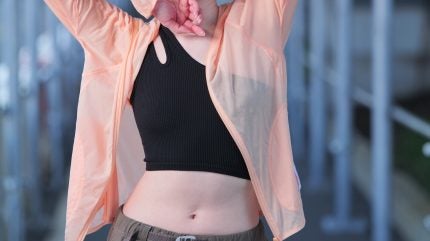
Paradise Textiles has unveiled a lightweight jacket as a “proof-of-concept” which it sees as a crucial milestone toward the commercial viability of Kintra’s bio-synthetic fibre — a sustainable alternative to fossil-based polyester.
Kintara’s proprietary resin, which is made on the same equipment as conventional polyester, is estimated to reduce emissions by 95%, water usage by 30%, and energy consumption by 20%, providing a sustainable alternative to polyester
Paradise Textiles explained that it selected this material due to its abrasion and pilling resistance, properties essential for garment longevity and reduced microfibre shedding, making it ideal for outerwear.
It said the jacket exemplifies Kintra’s compatibility with existing textile production machinery and dyeing processes, making it an ideal choice for brands seeking to transition to sustainable materials seamlessly.
According to Paradise Textiles, these advancements are achieved with the use of bio-based inputs, lower processing temperatures, and efficient production methods.
Upon the completion of a full life cycle assessment, the company expects to see continued energy savings and reduced Scope 3 emissions in downstream processes, including yarn spinning, dyeing, and finishing.

US Tariffs are shifting - will you react or anticipate?
Don’t let policy changes catch you off guard. Stay proactive with real-time data and expert analysis.
By GlobalDataIn terms of performance, Paradise Textiles shared that after conducting testing it found Kintra yarns are on par with polyester with regard to strength, yet are four times softer, and have twice the stretch, resulting in a unique fabric profile.
The company also noted that Kintara knits and wovens are on par with, or surpass, the polyester benchmark in strength and durability tests including tensile strength, seam slippage, tear strength, and abrasion and pilling resistance.
Lewis Shuler, head of innovation at Paradise Textiles said: “At Paradise, we continually seek innovative fibre technologies that offer a lower carbon footprint and serve as viable alternatives to fossil-based synthetics. Kintra not only meets these criteria but also delivers additional benefits in impact and performance. We are excited to further our collaboration, leveraging Kintra’s potential to engineer a diverse range of textiles.”
Billy McCall, CEO and co-founder of Kintra Fibers added: “The creation of this prototype is a testament to the viability of our material and a significant step forward in transforming the fashion industry toward sustainable practices. Paradise Textiles’ expertise in innovative fabric development has been instrumental in bringing our vision to life, and we are excited about the potential this partnership holds as we move toward commercial-scale production.”
This follows a successful pilot project in 2023 where the companies collaborated to create and rigorously test textiles made from Kintara’s yarns.
Recently, British climate tech company Matter and Paradise Textiles launched the so-called “world first” microfibre filter project for textiles.



